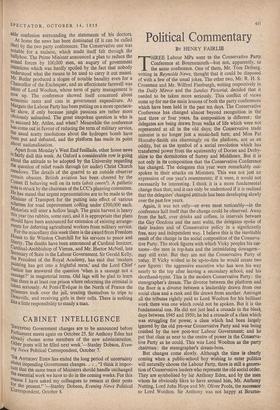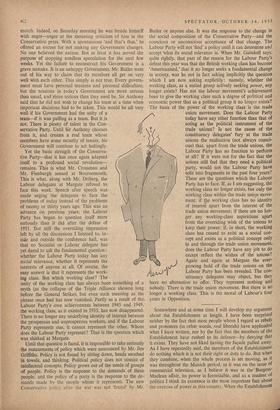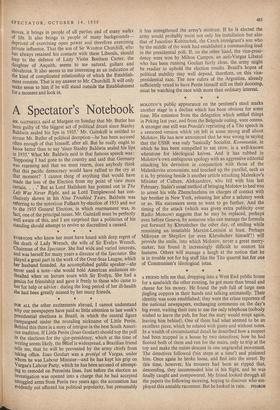Political Commentary
BY HENRY FAIRLIE THREE Labour MPs went to the Conservative Party Conference at Bournemouth—but not, apparently, to the same conference. One of them, Mr. Tom Driberg, writing in Reynolds News, thought that it could be disposed of with a few of the usual jokes. The other two, Mr. R. H. S. Crossman and Mr. Wilfred Fienburgh, writing respectively in the Daily Mirror and the Sunday Pictorial, decided that it needed to be taken more seriously. This conflict of views sums up for me the main lessons of both the party conferences which have been held in the past ten days. The Conservative Conference has changed almost beyond recognition in the past three or four years. Its composition is different: the delegates are being drawn from walks of life which were not represented at all in the old days; the Conservative trade unionist is no longer just a musio.hall turn; and Miss Pat Hornsby-Smith sits charmingly on the platform, not as an oddity, but as the symbol of a social revolution which has transferred power from the squirearchy of Dorset and Derby- shire to the dormitories of Surrey and Middlesex. But it is not only in its composition that the Conservative Conference has changed. The delegates this year were remarkably out- spoken in their attacks on Ministers. This was not just an expression of one year's resentments; if it were, it would not necessarily be interesting. I think it is a more fundamental change than that; and it can only be understood if it is realised that the delegates' changed attitude has been developing slowly over the past few years.
Again, it was not only—or even most noticeably—in the conference hall itself that the change could be observed. Away from the hall, over drinks and coffees, in intervals between the Gay Gordons and the next waltz, the delegates spoke of their leaders and of Conservative policy in a significantly free, easy and independent way. I believe this is the inevitable result of the change in the social composition of the Conserve. tive Party. The stock figures with which Vicky peoples his car- toons—the men in top-hats and the intimidating dowagers— may still exist. But they are not the Conservative Party of today. If Vicky wished to be up-to-date he would create two I new figures : the aggressive executive who has won his way nearly to the top after leaving a secondary school, and his shorthand-typist. This is the modern Conservative Party : the stenographer's dream. The divorce between the platform and the floor is a divorce between a leadership drawn from one social class and a rank and file drawn from another. Amongst all the tributes rightly paid to Lord Woolton for his brilliant work there was one which could not be spoken. But it is the fundamental one. He did not just lead a crusade in the bleak days between 1945 and 1950; he led a crusade of a class which was struggling for power, a class which had been largely ignored by the old pre-war Conservative Party and was being crushed by the new post-war Labour Government; and he put that class as near to the centre of power in the Conserva- tive Party as he could. This was Lord Woolton as the party chairman : the stenographer's dream-boss.
But changes come slowly. Although the time is clearly coming when a public-school' boy wishing to enter politics will naturally choose the Labour Party, there is still a genera- tion of Conservative leaders who represent the old social order. They are symbolised by Sir Anthony Eden, and by the men whom he obviously likes to have around him, Mr. Anthony Nutting, Lord John Hope and Mr. Oliver Poole, the successor to Lord Woolton. Sir Anthony was not happy at Bourne- mouth. Indeed, on Saturday morning he was beside himself with anger—anger at the mounting criticism of him in the Conservative press. With a spontaneous 'and that's that,' he offered an excuse for not making any Government changes. No one believed the excuse. But at least it has served the purpose of stopping needless speculation for the next few weeks. Yet the failure to reconstruct his Government is a grave mistake. It is an unhappy Government. Mr. Butler went out of his way to claim that its members all get on very well With each other. This simply is not true. Every govern- ment must have personal tensions and personal difficulties; but the tensions in today's Government are more serious than usual, and more serious than they need be. Sir Anthony said that he did not wish to change his team at a time when important decisions had to be taken. This would be all very well if his Government had the unity of a team—if it was pulling as a team. But it is not. There is plenty of talent in the Con- servative Party. Until Sir Anthony chooses from it, and creates a real team whose members have some security of tenure, his Government will continue to act haltingly.
Yet the basic strength of the Conserva- tive Party—that it has once again adapted itself to a profound social revolution— remains. This is what Mr. Crossman and Mr. Fienburgh sensed at Bournemouth. This is what, along with Mr. Driberg, the Labour delegates at Margate refused to face this week. Speech after speech was made urging the delegates to face the problems of today instead of the problems of twenty or thirty years ago. This was an advance on previous years; the Labour Party has begun to question itself more seriously than it did after the defeat of 1951. But still the overriding impression left by all the discussions I listened to, in- side and outside the conference hall, was that no Socialist or Labour delegate has yet dared to ask the fundamental question : whether the Labour Party today has any social relevance, whether it represents the interests of anyone at all. Of course, the easy answer is that it represents the work- ing class. But which working class? The unity of the working class has always been something of a myth (as the collapse of the Triple Alliance showed long before the General Strike); but even such meaning as the phrase once had has now vanished. Partly as a result of the Labour Party's own achievements between 1945 and 1949, the working class, as it existed in 1935, has now disappeared.
There is no longer any underlying identity of interest between the prosperous and unprosperous workers, and if the Labour Party represents one, it cannot represent the other. Whom does the Labour Party represent? That is the question which was shirked at Margate.
Until that question is faced, it is impossible to take seriously the restatements of policy which were announced by Mr. Jim Griffiths. Policy is not found by sitting down, heads swathed in towels, and thinking. Political policy does not consist of intellectual concepts. Policy grows out of the needs of groups of people. Policy is the response to the demands' of these people; and the policy of a party is the response to the de- mands made by the people whom it represents. The new Conservative policy after the war was not 'found' by Mr. Somewhere and at some time I will develop my argument about the Establishment at length. I have been surprised neither by the fact that most people whom I regard as rebels and protesters (in other words, real liberals) have applauded what I have written, nor by the fact that the members of the Establishment have rushed to its defence—by denying that it exists. They have not liked having the façade pulled away. As I have repeatedly said, the members of the Establishment do nothing which it is not their right or duty to do. But when they combine, when the whole process is set moving, as it was throughout the Munich period, as it was on the issue of commercial television, as I believe it was in the Burgess- Maclean affair, its power is formidable, and as a student of politics I think its existence is the most important fact about the exercise of power in this country. When the Establishment moves, it brings in people of all parties and of many walks of life. It also brings in people of many backgrounds— deprived of exercising open power and therefore exercising private influence. That the son of Sir Winston Churchill, who has always retained his contacts with these Liberals, should leap to the defence of Lady Violet Bonham Carter, the daughter of Asquith, seems to me natural, gallant and chivalrous. It also seems to me interesting as an indication of the kind of complicated relationship of which the Establish- ment consists. That is my answer to Mr. Churchill. It will only make sense to him if he will stand outside the Establishment for a moment and look in.












































 Previous page
Previous page